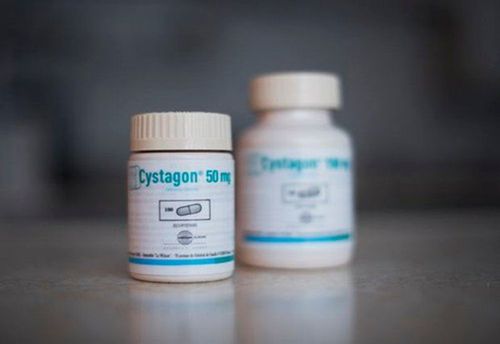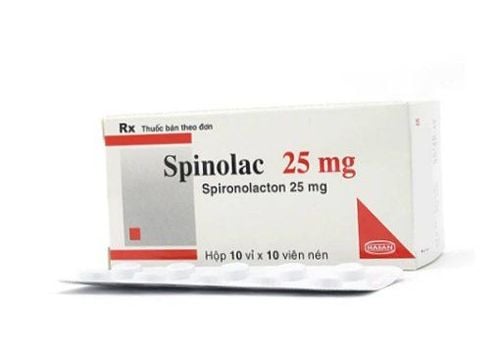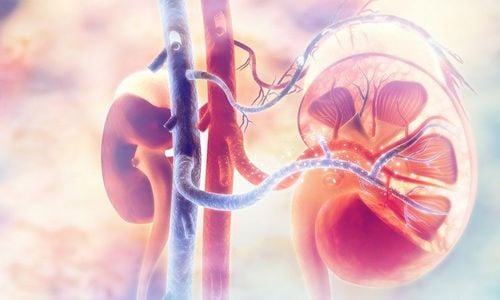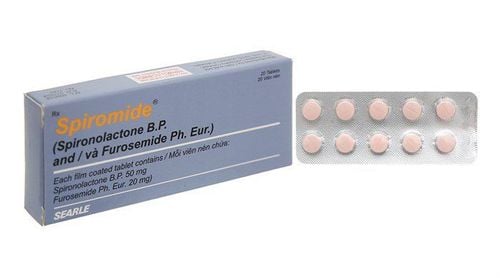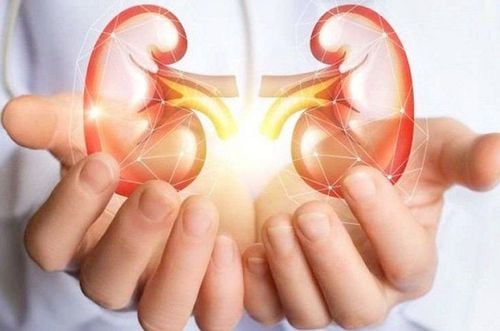This is an automatically translated article.
The pathological nephrotic syndrome occurs when the kidneys are damaged. If not diagnosed early and treated aggressively, protracted proteinuria will cause a series of dangerous diseases and complications.1. What is nephrotic syndrome?
The kidneys are an important part of the body with the function of eliminating harmful substances and reabsorption of essential substances, helping to control blood pressure as well as ensure an adequate blood supply. When the characteristic filtering function of the kidneys is disturbed, it will lead to a situation where protein from the body is excreted in the urine in a significant amount. If this condition lasts for a long time, the body is severely deficient in protein, which makes it difficult to maintain normal activities and activities.Nephrotic syndrome is a clinical and biochemical disease, formed when the glomerulus is damaged due to various pathological factors. Common symptoms of pathological nephrotic syndrome are edema, high proteinuria, decreased blood protein, dyslipidemia, can eliminate fat and protein through urine.
2. Causes and Diagnosis
Causes of secondary nephrotic syndrome include genetic factors, metabolic disorders, autoimmune diseases, malignancies, infections, drug toxicity or parasites. In addition, before leading to nephrotic syndrome, inflammation or glomerulosclerosis is a common disease in adults in some developing countries.To diagnose nephrotic syndrome, in addition to the typical symptoms of systemic edema, it is also mandatory based on the following criteria:
Proteinuria > 3.5 g/24 hours Blood protein decrease < 60 g/ liter, blood albumin decreased < 30 g/liter In addition, hypercholesterolemia ≥ 6.5 mmol/liter can be tested and there are birefringent fat particles or fatty deposits in the urine.
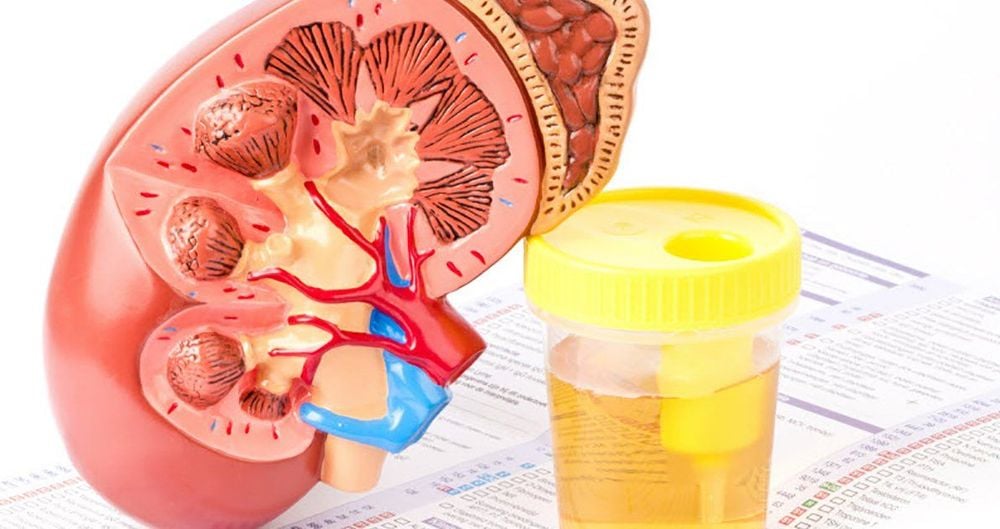
Trong hội chứng thận hư, protein niệu thường tăng
3. Dangerous Complications of Nephrotic Syndrome
Pathological nephrotic syndrome is a rather complicated condition, with the risk of serious complications, such as: it is a polymembrane effusion that includes ascites (peritoneal effusion), hydroceles, effusions of the testicles, lungs, or even the heart. Infections: Long-term treatment of kidney failure with corticosteroids and immunosuppressive drugs will cause severe infections that are difficult to control. The most common acute and chronic infections are cellulitis or peritonitis. Peptic ulcer, osteoporosis: These complications also stem from some side effects of the drugs included in the treatment regimen. High blood pressure, dyslipidemia: The decrease in protein in the blood causes the liver to increase the function of synthesizing lipoproteins to compensate for the increase in blood lipids. Embolism (thrombosis / blood clot): When blood albumin is severely reduced, it will lead to acute or chronic renal vein occlusion. In addition, there are cases of patients with iliac vein occlusion or, more rarely, pulmonary embolism. Acute or chronic kidney failure: Nephrotic syndrome causes the body to lose water and electrolytes, especially blood albumin, which reduces kidney function. This is the most common and dangerous complication of this disease, if severe, the patient may need dialysis or a kidney transplant. Gross or Microscopic Hematuria: A condition in which urine is brown or red, with blood visible when urinating due to kidney injury. Hematuria seen in nephrotic syndrome is not simple. Malnutrition: Due to excessive loss of protein through urine, this condition lasts for a long time, making the body increasingly exhausted. Some other possible complications include: Diabetes, gastrointestinal bleeding, mental disorders, pseudo-cushing syndrome, electrolyte disorders, ...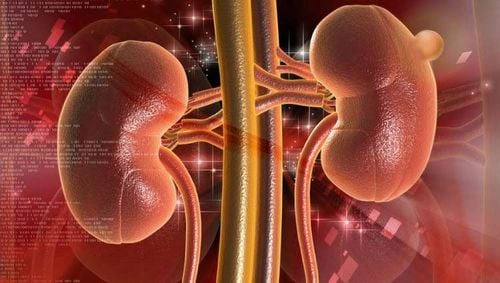
Hội chứng thận hư có thể gây ra nhiều biến chứng nguy hiểm
4. Treatment of nephrotic syndrome
How long to treat nephrotic syndrome or whether nephrotic syndrome can be cured is the question of many unfortunate patients with this condition. In fact, nephrotic syndrome is a chronic, slow-growing disease with a complex treatment process that may require lifelong follow-up. To limit the development of symptoms and complications, it is necessary to adhere to the following principles of treatment:Prioritize treatment of edema: Patients can change their diet to ensure adequate intake. protein (0.8-1g/kg/day + urinary protein loss). Besides, it is necessary to limit salt and water tolerance when there is a lot of edema. In addition, the doctor will prescribe additional solutions to increase oncotic pressure such as Albumin or use diuretics. Dosage is adjusted differently according to each patient's response to the drug. It is necessary to monitor urine output, daily weight and blood electrolytes. In the condition that kidney biopsy is not possible, it is possible to apply the regimen of corticosteroids or other immunosuppressive drugs. If the patient is still unresponsive, or it is difficult to avoid the side effects of the drug, a kidney biopsy should be indicated to treat according to the pathological lesion. Prophylactic treatment of some side effects of the drug as well as water and electrolyte balance, ensuring adequate albumin compensation. In the case of secondary nephrotic syndrome treatment should be considered according to the cause of the disease. The pathological nephrotic syndrome is not difficult to diagnose, but is chronic in nature and can recur. Therefore, if the patient has the disease, the patient needs to actively coordinate with the doctor for long-term monitoring and treatment according to the correct regimen. To prevent nephrotic syndrome, you should not use drugs and substances of unknown origin that will be toxic to the kidneys.
Vinmec International General Hospital is one of the hospitals that not only ensures professional quality with a team of leading medical doctors, a system of modern equipment and technology. The hospital provides comprehensive and professional medical examination, consultation and treatment services, with a civilized, polite, safe and sterile medical examination and treatment space. Customers when choosing to perform tests here can be completely assured of the accuracy of test results.
Please dial HOTLINE for more information or register for an appointment HERE. Download MyVinmec app to make appointments faster and to manage your bookings easily.




